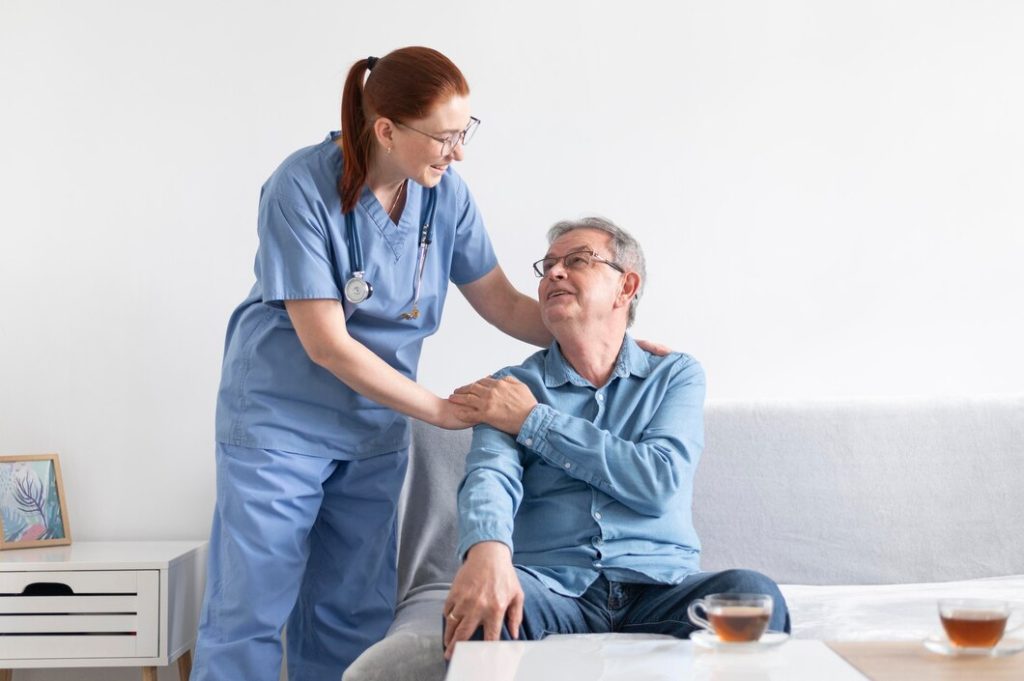Post-hospitalization home care involves a range of critical elements to ensure the patient’s recovery and well-being. Here are some key components:
- Care Coordination: Effective coordination between healthcare providers, including physicians, nurses, therapists, and caregivers, is essential. This ensures seamless transitions between hospital and home settings and facilitates the continuity of care.
- Medication Management: Proper management of medications, including adherence to prescribed regimens, monitoring for side effects, and ensuring timely refills, is crucial for preventing complications and promoting recovery. A caregiver can assist with this if the patient is still unwell or unable to handle this.
- Wound Care: If the patient has surgical wounds or other injuries requiring ongoing care, proper wound care techniques must be followed to prevent infection and promote healing.
- Monitoring Vital Signs: Regular monitoring of vital signs such as blood pressure, heart rate, temperature, and oxygen saturation can help detect any signs of deterioration or complications early on.
- Nutritional Support: Adequate nutrition is vital for recovery. This may involve meal planning, assistance with feeding if necessary, and monitoring for signs of malnutrition or dehydration.
- Personal Care Assistance: Patients may require assistance with activities of daily living such as bathing, dressing, grooming, and toileting. Caregivers should be trained to provide support while maintaining the patient’s dignity and privacy.
- Physical Therapy: For patients recovering from surgery, injury, or illness, physical therapy may be necessary to regain strength, mobility, and independence. This may involve exercises, stretching, and other rehabilitation techniques.
- Occupational Therapy: Occupational therapists can help patients develop skills and strategies to perform activities of daily living independently, such as cooking, cleaning, and dressing, while considering any physical or cognitive limitations.
- Emotional Support: Hospitalization and illness can be emotionally challenging for patients and their families. Providing emotional support, counseling, and resources for coping and mental health support is essential.
- Communication and Education: Clear communication with the patient and their family members about their condition, treatment plan, and goals of care is crucial. Educating them about warning signs, self-care techniques, and when to seek medical help can empower them to participate actively in their recovery.
- Safety Precautions: Assessing the home environment for potential hazards and implementing safety measures such as handrails, non-slip mats, and assistive devices can reduce the risk of falls and other accidents.
- Regular Follow-up: Scheduled follow-up appointments with healthcare providers, both in-person and remotely, are essential for monitoring progress, addressing concerns, and adjusting the care plan as needed.
By addressing these critical elements, post-hospitalization home care can help optimize patient outcomes, promote recovery, and enhance the overall quality of life.
CONTACT VITALIS HEALTHCARE
At Vitalis HealthCare, our team of certified, experienced and professional caregivers and registered nurses are efficiently trained to provide you with the best quality and compassionate home care services.
If you would like to hire a professional and competent caregiver, feel free to reach out to us through any of our contact details outlined below.
With us, you are in safe, competent and compassionate hands.
Phone Number
240.716.6874
Email:
info@vitalishealthcare.com
Location
We provide our services in every county in the State of Maryland, United States of America.
Office Address: 8757 Georgia Avenue Suite 440 Silver Spring, MD 20910.


